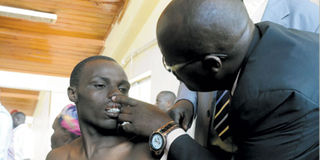Premium
Central Kenya ‘top husband-beaters’

JOSEPH KANYI | NATION
Maendeleo ya Wanaume chairman Nderitu Njoka examines Kevin Muriuki, 22, at Nyeri Provincial General Hospital on February 8 2012. Kevin, a father of three, says he was beaten up by a group of people after a conflict with his wife.
What you need to know:
- Lobby fighting for the rights of men against domestic violence vows to set up camp in area for three months
A lobby that fights for the rights of male victims of domestic violence says its officials will camp in central Kenya for three months to help deal with piling cases of domestic abuse.
Maendeleo ya Wanaume chairman Nderitu Njoka said his plate was full, trying to help battered men get legal redress to pull out of abusive marriages.
“Central Province is the worst place because women are in the habit of beating up their men. We are here to give women the ‘red card’ that such behaviour has to come to an end,” he told the Nation at the Nyeri Provincial General Hospital on Wednesday.
“Men should be respected as family heads, but in Central Kenya, they have been reduced to the role of fathering children before they are dumped,” he said.
The rising cases of single parenthood, where women are taking it upon themselves to raise children by themselves, and the piling divorce cases are testimony to the sad state of affairs, according to Mr Njoka.
Nursing his wounds at the hospital on Wednesday, Mr Kevin Muriuki, 22, swore he would end his six-year marriage over what he termed torture from his wife.
The hotel waiter from Skuta Estate is among many husbands in Central Province who claim they have been battered by their wives.
Mr Muriuki showed injuries he said were sustained, including a swollen back, seemingly the result of several whip lashes.
His head also had bumps, and he was limping after three men descended on him. His accusing fingers are pointing at his wife, a 21 year-old beautician, whom he claims hired his attackers.
“All this has been orchestrated by my wife who had accused me falsely of beating up our first-born child,” he said.
But on Thursday, when the Nation reached the woman he alleges hired goons to beat him up, Ms Magdalene Wamaitha said she had nothing to do with the attack on her husband.
She says she saw a neighbour enquiring from her daughter what had happened after she noticed the girl’s head was swollen.
Child’s confession
The next thing she knew was that some people she could not recognise were beating up her husband, she says, adding it may have been as a result of the child’s confession that it was her father who had harmed her.
“I was hanging clothes out to dry in the back yard, and on returning, I found that there were people beating up my husband.
“I tried to intervene to urge them to stop but they warned me to stay away. I had nothing to do with it,” she told the Nation from her home in Skuta Estate in the outskirts of town.
But Mr Muriuki said he loves the child and would never beat her up.
He claims the child was apparently pierced by a nail during play, but when her mother returned, she blamed it on him.
Mr Muriuki said he was at home during the incident, and took the child to a nearby health centre, where she was treated.
Yet a day later, he says, his wife left their rented house in the evening to buy groceries, and did not return until after 30 minutes. The distance from the house to the grocer, according to Mr Muriuki, should not take more than five minutes of walking.
On returning, he tried to question her, but she responded coldly, and scolded him for beating up the child.
Moments later, Mr Muriuki says, there was a knock on the door and when he went to answer it, three men descended upon him with kicks, blows and whips.
Mr Muriuki told journalists that the men who assaulted him kept asking why he beat up the child, and why he was not supportive by leaving behind enough cash for family shopping.
The incident comes hot on the heels of another one in which 27-year-old Patrick Kimaru Mwangi from Kangemi Estate in Nyeri claimed assaulted him last month. She has since been charged with assaulting her husband, and the case is pending in court.
Maendeleo ya Wanaume claims 460,000 cases of domestic abuse were reported in central Kenya, last year in a survey that includes Nairobi area.
Of these, 150,000 had reported undergoing emotional abuse while 300,000 cases had been physically assaulted.
Mr Njoka claims 300,000 men were battered by their spouses, making the region the worst place in the country for men in wedlock.
The provincial hospital now plans to start a gender violence section due to the rising cases of abuse at home.
“We are looking for one stop shop where victims of gender abuse can get treatment and counselling at the same time,” said the hospital’s deputy medical superintendent, Dr J. K. Macharia.
But Mr Njoka blames “female superiority complex” for the rising cases of husband battery, tracing its roots to the high handed female colonial chief, Wangu wa Makeri, who reigned in Murang’a with an iron fist, and was particularly hard on men.




